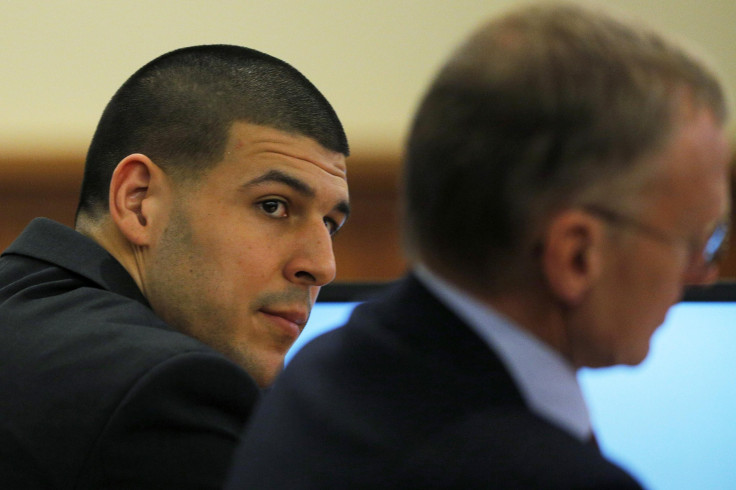Aaron Hernandez Trial: Not Guily Verdict A Possibility For Ex-NFL Star

Former New England Patriots tight end Aaron Hernandez was arrested for the murder of semi-pro football player Odin Lloyd over 21 months ago. Hernandez has been in Nashua Street Jail in Boston ever since, as he stands trial for murder.
The prosecution called 132 witnesses to the stand since the trial began on Jan. 29, and presented their closing arguments on Tuesday. Prosecutors detailed how Hernandez drove Lloyd to an industrial park near his home on the night of June 17, 2013, shot and killed him and subsequently tried to cover up the murder.
But a conviction for the ex-NFL star is anything but a guarantee.
"He will be acquitted," famed defense attorney Barry Slotnick told International Business Times. "He will be acquitted because there was not enough evidence proven beyond a reasonable doubt."
The defense only called three witnesses to the stand in one day, before making a closing statement. Defense attorney James Sultan called the investigation “incomplete” and “sloppy,” claiming police had not been fair to either Hernandez or Lloyd.
Hernandez did not take the stand.
DNA evidence indicates that Hernandez was at the scene of the crime. Instead of arguing that Hernandez was elsewhere, the defendant’s lawyer argued that his client was present during the murder as an innocent bystander.
"He was a 23-year-old kid who witnessed ... a shocking killing committed by somebody he knew," Sultan told the court. "He really didn't know what to do. So he just put one foot in front of the other."
Carlos Ortiz and Ernest Wallace were allegedly present at the time of Lloyd’s death, and they are set to be tried separately for Lloyd's murder. Sultan suggested that one of them could’ve pulled the trigger, citing their criminal records that include arrests for PCP possession. The defense’s first witness was Tufts Medical Center psychopharmacologist Dr. David Greenblatt, who testified that the drug can cause aggressive behavior.
Hernandez’s DNA was found on a shell casing that was retrieved from the car he rented and drove on the night of the murder, but the defense claims there is no proof that Hernandez shot Lloyd. The casing, as well as a piece of gum, were pulled from a dumpster by police, after the Enterprise Rent-A-Car manager threw both items in the garbage. Because the gum that had been chewed by Hernandez was stuck to the casing, Sultan said Hernandez’s DNA transferred onto the casing.
The murder weapon has never been found, leaving no hard evidence that Hernandez handled the gun. Hernandez’s lawyers hadn’t said that Hernandez witnessed the shooting until the closing statements, and introducing this admission before deliberations began could work in Hernandez’s favor.
"It’s usually done by a very smart criminal defense lawyer who knows that juries can easily take what he says and run with it," Slotnick said. "So he’s now saying that Hernandez was (there). He wasn’t anything more than an unneeded witness, and it’s a very clever thing to do. The jury may be taken by this defense lawyer’s statement and give him great credibility. Because remember, at the end of the trial, he said, 'My client has not been proven guilty beyond a reasonable doubt. My client is innocent.'"
"I think the defense lawyer did a very good job. I think he understood that juries can be led by a defense lawyer, not inappropriately, but it’s the right thing to do."
Even if the jury finds that Hernandez did not pull the trigger, they could still convict him of first-degree murder for being complicit in Lloyd's death. A not-guilty verdict would not release Hernandez from prison, since he’s been charged with two other murders stemming from a July 2012 shooting in a separate case.
© Copyright IBTimes 2024. All rights reserved.












